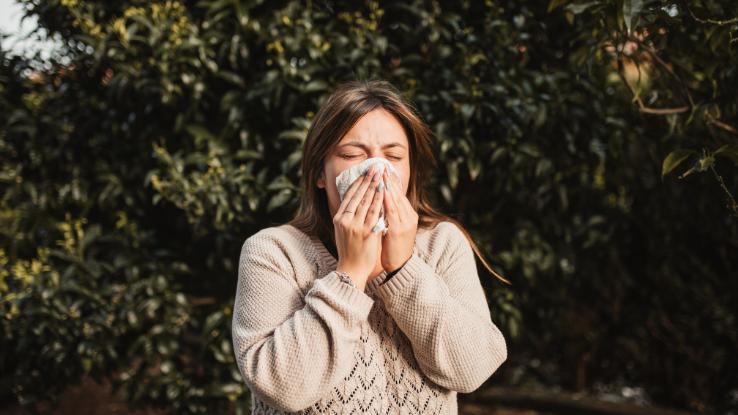Allergies 101: Types, Symptoms, Causes & Treatments

Approximately 50 million Americans are affected by some form of allergy. Many substances in our environment can trigger allergy symptoms, some of which are easier to avoid than others. An allergic reaction occurs when the immune system mistakenly identifies a substance (an allergen) as harmful to the body. The body’s reaction to this “false alarm” produces a series of unpleasant symptoms.
Depending on the type of allergy, symptoms can occur in the eyes, nose, throat, sinuses, lungs, in the lining of the stomach, or on the skin. Sometimes, the allergic reaction is severe, leading to breathing problems, serious skin rashes, or a life-threatening reaction called anaphylaxis. At other times, allergies symptoms, like itchy eyes and a runny nose, are much more manageable.
In the same way symptoms vary greatly, avoiding allergies or mitigating exposure to triggers can be tricky. Sometimes, it involves avoiding a particular substance, while, in other cases, patients can treat allergies using over-the-counter medications; medicines prescribed by a doctor; or allergy shots. All of this to say, it’s important to be prepared and understand your specific allergies more thoroughly.
Common Types of Allergies
Food Allergies: This type of allergy occurs when the body misidentifies certain foods as harmful. Some common food allergens include peanuts, shellfish, soy, wheat, milk, and eggs. Many of these allergens (e.g. soy, wheat) are “hidden” in processed foods and can be difficult to identify as the source of the allergic reaction. Food allergies affect up to eight percent of children under the age of three years, and up to three percent of adults.
Drug Allergies: This type of allergy occurs when the body misidentifies certain medications as harmful. Penicillin and antibiotics are the most common causes of drug allergies, but pain relievers; anticonvulsants; insulin; drugs used to treat rheumatoid arthritis; and X-ray contrast dyes can all trigger allergic reactions. Additionally, drug allergies can occur with over-the-counter medications and herbal supplements, not just medicines prescribed by your doctor.

Seasonal Allergies:
Also known as hay fever or allergic rhinitis, this type of allergy occurs when the body misidentifies pollen or mold particles as harmful. Because more of these particles are released during spring, summer, and fall, symptoms tend to develop or worsen at these times of the year.
Symptoms of Allergies
The types of symptoms a person experiences is often related to the allergen to which they have been exposed. For example, when someone eats a food that they are allergic to, they will usually experience symptoms related to their digestive system, such as stomach cramps or diarrhea. Likewise, allergens that are inhaled typically result in breathing, nose and throat problems, while allergens that touch the skin usually lead to hives, itching or rashes.

Allergies can produce a wide variety of symptoms, including:
- Coughing
- Shortness of breath
- Wheezing
- Chest tightness
- Runny nose
- Congestion
- Itchy nose, throat, mouth, eyes or skin
- Burning or watery eyes
- Conjunctivitis
- Stomach cramps
- Diarrhea
- Vomiting
- Skin rashes
- Skin swelling
- Urticaria (hives)
For people with more severe allergies — usually those related to foods or insect bites — a severe reaction called anaphylaxis may occur. This condition requires emergency medical care and may cause the following symptoms:
- Skin rash
- Swollen face and airway
- Noisy breathing
- Severe shortness of breath
- Rapid, weak pulse
- Nausea and vomiting
- Lightheadedness
- Loss of consciousness
Untreated, anaphylaxis can lead to death.
Causes and Risk Factors
Allergic reactions begin in the immune system, which is designed to protect us from harmful invading organisms, including bacteria and viruses, that have potential to cause illness. Allergies are caused by the immune system mistakenly identifying a substance (an allergen) as a harmful invader.
If you have an allergy, your immune system overreacts when it encounters the allergen by producing immunoglobulin E antibodies, which bind to specialized cells called mast cells, which then release a chemical called histamine. In turn, histamine triggers the allergic reaction. Mast cells are present in the eyes, nose, mouth, throat, stomach, and skin — the sites involved in common allergy symptoms.

Some risk factors increase your chances of developing allergies, including:
- Being a child: Children are more likely than adults to develop allergies. Sometimes children will outgrow an allergy or the allergy will go away and then come back later in life.
- Having asthma: People with asthma are more likely to develop an allergy.
- Having other allergies: People who have an allergy to something are more likely to develop other allergies.
- Having a family history of asthma or allergies: When a family member has an allergy or asthma, it increases an individual’s risk for developing an allergic condition. Both genetics (your family history) and your environment likely play a role in your potential allergy development.
Prevention & Treatment
The best way to prevent an allergic reaction is to avoid the allergen. Depending on the allergy, that could mean different things. If you suffer from seasonal or dust allergies, you could use a special air filter (e.g. a HEPA filter) to reduce allergens in the air, for example. Additionally, keeping your home free of dust, smoke, mold, mildew, and pet dander may help.
If you suffer from insect-sting allergies, wear light-colored clothing that covers more of your skin when outdoors. If you have a food allergy, it might take some time to identify the specific food that triggers a reaction before you can eliminate it from your diet.

Many allergies are effectively treated with medications like corticosteroids, decongestants, antihistamines, leukotriene modifiers, and cromolyn sodium (a mast cell inhibitor). Both over-the-counter and prescription medications are available, so ask your doctor which medicine might work best for you.
In some cases, immunotherapy can be administered via a series of injections (allergy shots). This approach uses small amounts of the allergen to “train” your immune system to recognize it as not harmful. Immunotherapy may be able to reduce the severity of an allergic condition over a number of years. Finally, those with severe allergies often have to carry an emergency epinephrine shot, an “EpiPen” with them. If a severe allergic reaction occurs, this injection can be used to reduce symptoms until emergency medical care arrives.
Although allergies are quite common, it’s important to seek treatment to reduce your symptoms and avoid potentially dangerous breathing issues. Those with severe allergies should consider wearing a bracelet or other identifying accessory to alert others of their need for immediate medical attention if a severe allergic reaction occurs.
Resource Links
- “Allergies” via American Academy of Allergy Asthma & Immunology (AAAAI)
- “Allergic Reactions | Allergy Library” via American Academy of Allergy Asthma & Immunology (AAAAI)
- “Types of Allergies” via Global Allergy & Airways Patient Platform
- “Allergy” via MedlinePlus
- “Drug Allergy” via Mayo Clinic
- “Food Allergy” via Mayo Clinic
- “Allergies — Symptoms & Causes” via Mayo Clinic
- “Allergy-proof Your Home” via Mayo Clinic
- “Allergies — Insects: Bees, Wasps & Hornets” via Centers for Disease Control and Prevention (CDC)
- “Allergy Shots: Could They Help Your Allergies?” via FamilyDoctor.org





